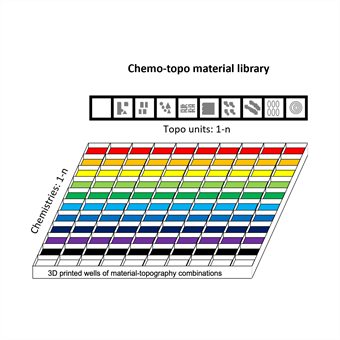MAKE
ChemoTopoChips to efficiently explore the possible design space

This work package will produce the materials (in the form of ChemoTopoChips) and devices needed by the MEASURE WPs to generate biological response data. MODEL will define the first MAKE experiments, exploiting existing large datasets from the Discovery-PG. The additive manufacturing (AM) technique of pμSLA will be used, since it can form features of ~10 μm (with smaller gaps) with a higher throughput than 2PP. When features of less than ~2 μm are required, 2PP will be employed. The 3D printing “Inks” and manufacturing screening technologies recently developed at Nottingham (Wildman et al.; Zhou 2019; Ruiz-Cantu 2020) will be used to to ensure that candidate materials are processable within the chosen production setting whilst retaining their bio-instructive properties.
The final output from MAKE will be the development of prototype devices suitable for in-vivo testing in small animal models. This requires replication of meshes, and films in appropriate sizes. Follow-on work will address the manufacture of full-scale devices from the lead material-topography combinations to deliver the large-scale manufacturing techniques, e.g. roll-to-roll embossing, using the knowledge base built up in this project.